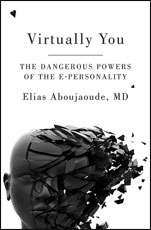Elias Aboujaoude is a psychiatrist at the Stanford University School of Medicine, where he serves as director of the Obsessive Compulsive Disorder Clinic and the Impulse Control Disorders Clinic. He helped lead the largest U.S. study of the Internet habits of over 2,500 adults which revealed "alarming rates of online pathological behavior that cut across geographic, socioeconomic, age, and gender differences." Aboujaoude is convinced that the Internet is changing "the ways in which we act, interact, speak, read, think, and negotiate urges and goals." For him, this technological tool is a "gateway drug" of sorts that has paved the way to other addictions.
The predominance of cyberspace in our lives has led to the creation of the "e-personality" that forges connections with friends and strangers but also is aggressive, assertive, obsessed with sex, and under the guise of anonymity very nasty and critical of others. Aboujaoude's tour of online behavior uncovers evidence of grandiosity, narcissism, bullying, identity theft, violence, and all forms of negativity and impulsivity.
The author is quite creative in his inventive takes on the Internet's impact on privacy, memory, knowledge (the experts have been replaced by ordinary folk), and time (we are super busy but do not make time to reflect on our experiences). Aboujaoud's hard-hitting critique of what the virtual world is doing to us is meant to serve as a wake-up call. In the last five years, Americans have doubled the hours they spend online, going way beyond their television time and tripling the time they spend reading printed newspapers and magazines. One thing is perfectly clear: we must welcome more study of the Internet and what is happening to us as we use it.
